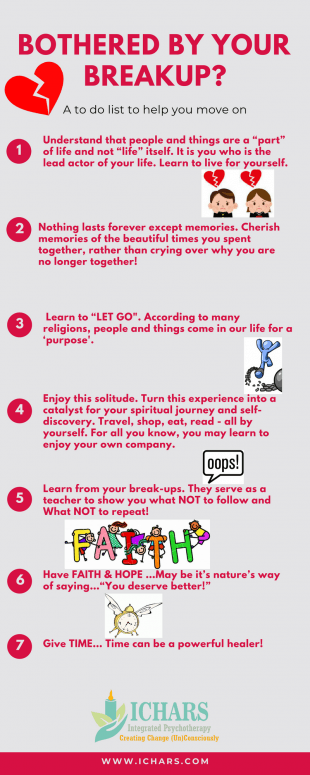In life, we often face challenges that tear at the very fabric of our existence. One such challenge, universally experienced yet seldom addressed, is the aftermath of a breakup.
No university, school, culture, or the law of the state.. really teaches us how to deal with breakup, how to manage rejection & the pain that comes with it. Most importantly how to still love oneself despite being left by the one we loved.
This post aims to provide not only practical tips for individuals navigating through the emotional aftermath but also insights into therapeutic techniques employed by professionals to aid in this journey.
Tips to Move On After a Breakup: A Guided Journey
Going through a breakup is undoubtedly one of life’s toughest challenges. Here are some heartfelt tips that, while we hope you never need, can be your companions on the path to healing:
- Life’s Ensemble: Understand that people and things are components of your life, not its entirety. You are the lead actor of your life’s drama. Live for yourself—immerse in activities you love or explore new passions like baking or gardening after a breakup.
- Taking a Step for Yourself: Acknowledge that it can be incredibly difficult to find the motivation to do anything. Nevertheless, take that step for yourself. In challenging times, small actions for self-care can make a significant difference.
- Cherishing Memories: Memories are everlasting, even if the moments are not. Cherish the beautiful times rather than dwelling on the pain of their absence. Reflect on the joy you shared instead of lamenting their departure.
- The Art of Letting Go: If cherishing memories doesn’t bring relief, learn to “let go.” Many philosophies suggest that people and things enter our lives for a purpose—to teach us life’s lessons. Letting go creates space for new experiences and opportunities.
- Solitude as a Catalyst: Transform solitude into a catalyst for spiritual growth and self-discovery. Embrace your own company; travel, shop, eat, and read—all solo. This experience can be an enriching journey rather than a painful scar.
- Learning from Breakups: Treat breakups as valuable teachers. Reflect on what not to follow and what patterns to avoid in future relationships. Every breakup holds lessons for personal growth.
- Faith and Hope: Maintain faith and hope. Sometimes, the end of a relationship is nature’s way of signaling that you deserve something better. Trust in the unseen possibilities that lie ahead.
- Time as a Healer: Give yourself the gift of time. Time has a profound healing effect. Allow yourself the space to heal at your own pace, without rushing the process.
- Professional Support: If moving forward seems insurmountable, consider seeking help from a therapist, psychologist, or any professional dedicated to guiding individuals through pain. A few sessions can be transformative, aiding in personal growth and resilience.
Remember, healing is a unique journey for each individual. These tips are here to accompany you on your path towards rediscovering joy and becoming the best version of yourself.
Note:
The insights shared in this article aim to assist you in navigating the challenges associated with the loss of love. If you seek clarity on learning from your past relationships, not only to facilitate moving on after a breakup but also to guarantee that your future relationships are characterized by greater happiness, health, and fulfillment, we recommend exploring our Online Course: “Ultimate Guide to Love, Dating, and Relationships.“
Empowering Clients Post-Breakup: A Therapeutic Approach
- Understanding Client Needs: Clients seeking assistance post-breakup often grapple with a spectrum of emotions—ranging from fear and anxiety about the future to suppressed guilt, helplessness, and lingering anger from the past. Addressing this emotional complexity is paramount for effective therapeutic support.
- Guiding Emotional Transformation: To facilitate a client’s post-breakup journey, therapists must adeptly navigate and transform these emotions. This involves understanding, releasing, and replacing negative emotions. Crucially, therapists guide clients to achieve complete disconnection from their ex-partner on physical, mental, and emotional levels.
- Preparing for Future Relationships: Therapy sessions extend beyond immediate relief. They should equip clients not only to move forward but also to glean lessons from their past relationships after a breakup. This preparation is essential for fostering healthier future relationships.
- Instilling Hope for a Brighter Future: Therapists play a pivotal role in instilling hope. Clients need to envision a future that is not only free from the shadows of a breakup but also filled with the promise of a happier life. This positive outlook becomes a cornerstone for post-breakup recovery.
Therapeutic Techniques for Post-Breakup Healing
- Hoponopono, HypnoDrama, and Inner Child Therapy: Effectively address anger, guilt, and helplessness, providing clients with tools to navigate complex emotions.
- Cord Cutting: Facilitate emotional disconnection from the ex-partner, promoting mental and emotional healing.
- Transformational Metaphor, If-Then Statements, and Circle Therapy: Tackle fear, anxiety, and worries through a combination of transformative techniques, promoting emotional resilience.
- Revelation Metaphors and Perceptual Position Process: Aid clients in learning from their past relationships, fostering personal growth and insights.
- SOFT SEA™ Coaching Model: Guide clients in setting clear post-breakup goals, fostering hope for a brighter future. This model aids in systematic planning for a fulfilling life ahead.
Comprehensive Therapeutic Skill Development
All these techniques and more are integral parts of our advanced therapeutic skill development program, Cognitive Hypnotic Psychotherapy®. Offering an eclectic approach that seamlessly integrates cognitive, behavioral, psycho-dynamic, and humanistic methods, this program ensures a holistic and effective training experience. Join the many individuals who have found transformative value in our program.
Conclusion
Empowering clients post-breakup requires a nuanced understanding of emotions, strategic therapeutic interventions, and a commitment to long-term personal growth. Our program, Cognitive Hypnotic Psychotherapy™, stands as a testament to our dedication to providing comprehensive and effective therapeutic training.


